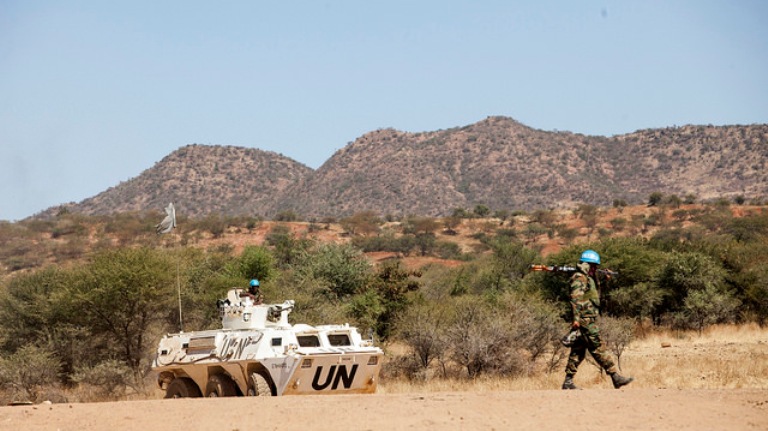Security Council endorses UNAMID cuts, says peace in Darfur is needed for exit

June 29, 2017 (WASHINGTON) – As it was announced in the decision of the African Union earlier this month, the UN Security Council Thursday reduced the peacekeepers deployed in Darfur region. But it stressed that the end of the hybrid mission can only be decided after the signing of a lasting peace deal.
The 15-member body adopted Resolution 2363, in which it extended the mandate of the UN-African Union Mission in Darfur (UNAMID) until 30 June 2018.
Also, the Council also decided that from 31 January next year, UNAMID’s troop and police ceiling shall be reduced to consist of up to 8,735 military personnel and 2,500 police personnel, including individual police officers and members of formed police units.
The decision was taken upon a joint review conducted by the African Union and the United Nations underscoring the improvement of the relative security situation on the grounds and the drastic reduction of violence.
Nonetheless, it pointed to the existence of several holdout groups that the government needs to reach a negotiated settlement with them and the presence of nearly two million internally displaced persons (IDPs) in the camps since 2003.
In response to the Sudanese government’s demand for an exit strategy end the presence of Darfur peacekeeping operation, the Council, however, mentioned the need to fulfil the benchmarks defined it is previous resolutions particularity the conclusion of a political agreement with the armed groups.
The Council “takes note that the Secretary-General, in his report of 26 May 2015 (S/2015/378), emphasises that a political settlement in Darfur and direct talks between Government and the non-signatory armed movements, starting with a cessation of hostilities in Darfur, is essential to re-establishing peace in Darfur and is primary to the achievement of these benchmarks,” reads the resolution.
Also, in order to monitor the impact of troops withdrawal, the resolution asks to report to the Council every 60 days on the political, humanitarian and security situation in Darfur, including attacks against civilians, especially sexual and gender-based violence.
Based on this reports, the Council can decide to stop the troops’ withdrawal if there is a recrudescence of violence against civilians or a renewal of intercommunal fighting.
The Sudanese ambassador to the United Nations praised the reduction of UNAMID troops and called to support the government efforts for development in the region.
He also said that Darfur today is free of armed groups and pointed to rebel “attempts to destabilise peace and security” last May, stressing on the readiness of Sudanese government troops to support peace and protect civilians.
The Sudanese diplomat further pledged to cooperate with the UNAMID to achieve its mandate.
However, a human rights expert and a Senior Policy Advisor at Enough Project, Omer Ismail regretted the troops’ cuts saying it was based on ” a fundamentally flawed analysis of the situation in Darfur”.
He said the withdrawal of troops from many areas while still exists a high risk of conflict potentially endangers the lives of civilians.
“The withdrawal of these UNAMID military forces and the closure of bases will make several key areas unsafe for humanitarian operations,” he stressed.
According to the resolution, the hybrid mission will be reduced by withdrawing the military personnel by 44% and that of the police component by 30%, the closure of 11 team sites in the first phase and the withdrawal of the military component from another 7 team sites in the second phase.
An international official told the AFP that the cuts in the 13 peacekeeping missions have been decided as a result of U.S. pressure.
The U.S., which is the biggest financial contributor to the peacekeeping operations, announced it would cut nearly $1.3 billion of its contribution to the UN peacekeeping operations.
(ST)
